Are you curious about the net carbs in refried beans? Let’s dive in and uncover the truth!
Factual data: Refried beans are a popular side dish in Mexican cuisine, but are they keto-friendly? A cup of cooked refried beans contains 26g of net carbs, which exceeds the daily carb limit for many people on a keto diet. Beans can also cause inflammation and digestive problems. However, there are ways to make refried beans more keto-friendly. One option is to use organic black soybeans instead of pinto beans, as they are lower in carbs.
Green beans and black soybeans are also low in carbs and can be incorporated into a keto diet. It’s important to be mindful of portion sizes and to consult with a dietitian or health professional for personalized guidance. Additionally, there are other low-carb alternatives to beans, such as mushrooms, zucchini, and cauliflower, that can be used in bean recipes.
- Refried beans contain a significant amount of net carbs, making them unsuitable for a keto diet.
- Consuming refried beans can lead to inflammation and digestive issues for some individuals.
- Organic black soybeans are a lower-carb alternative to pinto beans for making keto-friendly refried beans.
- Green beans and black soybeans can be incorporated into a keto diet due to their low carb content.
- Consult with a dietitian or health professional for personalized guidance on incorporating refried beans into your diet.
Now that you have a better understanding of the net carbs in refried beans, you can make informed choices about including them in your diet. Remember, moderation and personalization are key when it comes to achieving your health and wellness goals.
The Nutritional Value of Refried Beans
Before we get into the net carbs, let’s take a closer look at the overall nutritional value of refried beans. These delicious legumes are a staple in Mexican cuisine, packed with essential nutrients that our bodies crave. A cup of cooked refried beans contains approximately 227 calories, making them a satisfying addition to any meal.
Refried beans are an excellent source of protein, providing about 15 grams per cup. Protein is essential for muscle growth and repair, as well as helping you feel full and satisfied. They are also rich in dietary fiber, with around 15 grams per cup, which supports healthy digestion and can aid in weight management.
When it comes to vitamins and minerals, refried beans are a powerhouse. They are particularly high in folate, iron, magnesium, and potassium. Folate is essential for cell growth and development, while iron helps transport oxygen throughout the body. Magnesium and potassium are crucial for heart health and maintaining proper muscle function.
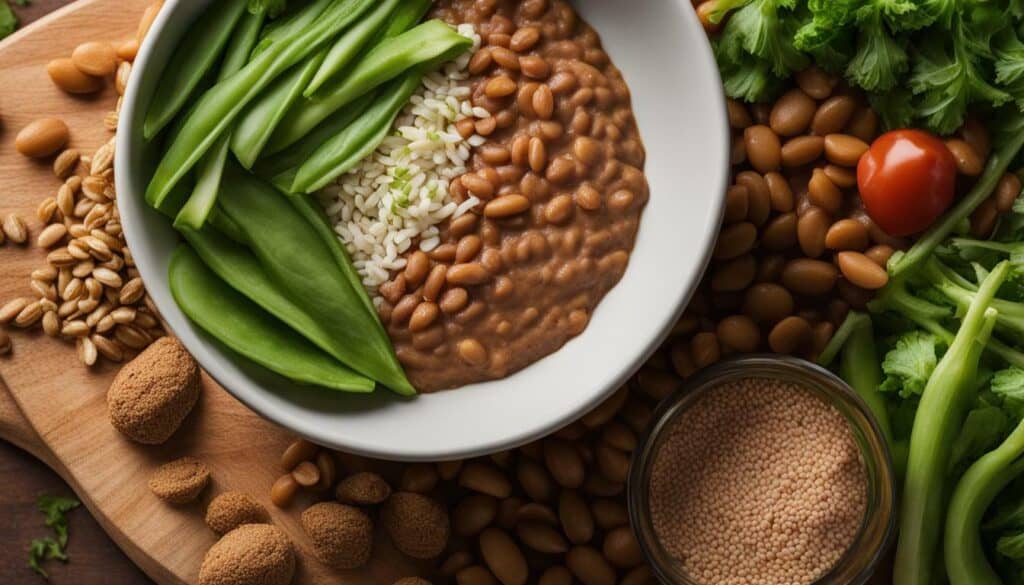
| Nutrient | Amount per Cup (Approx.) |
|---|---|
| Calories | 227 |
| Protein | 15g |
| Dietary Fiber | 15g |
| Folate | 294mcg |
| Iron | 3.9mg |
| Magnesium | 90mg |
| Potassium | 601mg |
As you can see, refried beans offer a wide range of nutritional benefits. However, it’s important to note that their net carb content should be considered, especially for those following a keto or low-carb diet. In the next section, we will dive into the net carbs found in refried beans and explore their impact on your diet.
Counting Net Carbs in Refried Beans
Understanding the net carb count in refried beans is crucial to managing your carbohydrate intake. Let’s break it down together.
Refried beans are a popular side dish in Mexican cuisine, but they can be high in carbohydrates. A cup of cooked refried beans contains approximately 20 grams of total carbohydrates and 6 grams of fiber, resulting in a net carb count of 14 grams. Net carbs are calculated by subtracting the fiber content from the total carbohydrates.
To put this into perspective, a typical keto diet recommends consuming no more than 20-50 grams of net carbs per day. This means that a serving of refried beans can easily take up a significant portion of your daily carb allowance.
It’s important to note that while refried beans may not be the best choice for those following a strict keto diet, they can still be enjoyed in moderation. Incorporating them into your meals mindfully and balancing them with other low-carb options can help you fit them into your overall dietary plan.
| Refried Beans (1 cup, cooked) | Total Carbohydrates | Fiber | Net Carbs |
|---|---|---|---|
| Pinto Beans | 20g | 6g | 14g |
When counting net carbs in refried beans, it’s important to pay attention to portion sizes. Consuming a smaller portion can help you keep your carb intake in check. Additionally, consulting with a dietitian or health professional can provide you with personalized guidance on incorporating refried beans into your diet while still meeting your nutritional goals.
If you’re looking for keto-friendly alternatives to refried beans, consider using black soybeans, green beans, or even low-carb vegetables like mushrooms, zucchini, and cauliflower. These options are lower in net carbs and can be used to create delicious and satisfying dishes that fit into your low-carb lifestyle.
By being mindful of your net carb intake and exploring alternative options, you can still enjoy the flavors of refried beans while staying on track with your dietary goals.
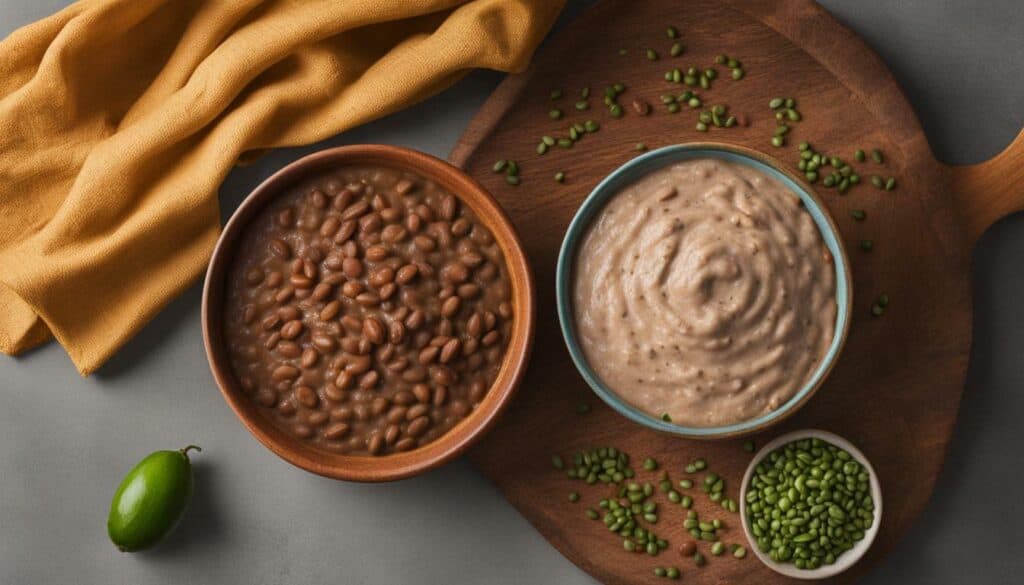
If you’re on a keto diet, you may wonder if refried beans can fit into your meal plan. Let’s examine their impact on ketosis.
Factual data: Refried beans are a popular side dish in Mexican cuisine, but are they keto-friendly? A cup of cooked refried beans contains 26g of net carbs, which exceeds the daily carb limit for many people on a keto diet. Beans can also cause inflammation and digestive problems. However, there are ways to make refried beans more keto-friendly.
One option is to use organic black soybeans instead of pinto beans, as they are lower in carbs. Green beans and black soybeans are also low in carbs and can be incorporated into a keto diet. It’s important to be mindful of portion sizes and to consult with a dietitian or health professional for personalized guidance. Additionally, there are other low-carb alternatives to beans, such as mushrooms, zucchini, and cauliflower, that can be used in bean recipes.
| Refried Beans Alternatives |
|---|
| Mushrooms |
| Zucchini |
| Cauliflower |
“Using alternative ingredients like mushrooms, zucchini, and cauliflower in your recipes can provide a similar taste and texture to refried beans while keeping your carb intake low.”
By exploring these low-carb alternatives, you can still enjoy the flavors of refried beans while adhering to your keto diet.
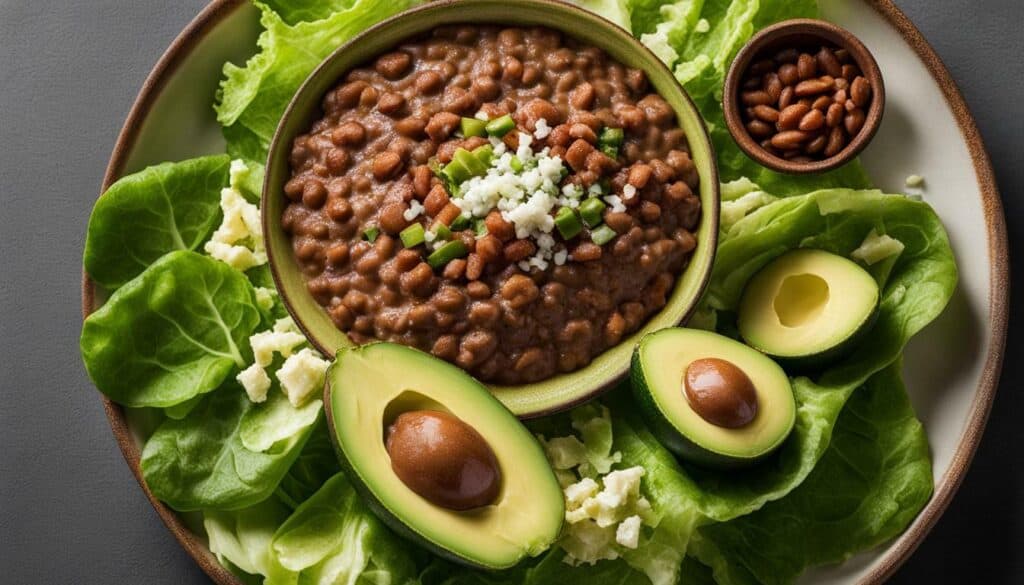
- Refried beans are not typically keto-friendly due to their high carb content.
- Organic black soybeans, green beans, and other low-carb vegetables can be substituted for traditional refried beans.
- Consult with a dietitian or health professional for personalized guidance on incorporating refried beans or alternatives into your keto diet.
The Health Concerns of Refried Beans
While refried beans are a tasty side dish, it’s important to be aware of potential health concerns they may pose. Consuming refried beans regularly may lead to inflammation and digestive problems in some individuals. This is primarily due to the high levels of lectins and phytates found in beans.
Lectins are proteins that can bind to the lining of the gut, potentially causing damage and triggering an immune response. Phytates, on the other hand, can interfere with the absorption of important minerals like iron, zinc, and calcium. This can lead to nutrient deficiencies over time.
For those with certain health conditions, such as leaky gut syndrome or irritable bowel syndrome (IBS), the consumption of refried beans may exacerbate symptoms and contribute to discomfort. It’s important to listen to your body and pay attention to any adverse reactions you may experience after eating refried beans.
However, it’s worth noting that not everyone will experience these issues, and refried beans can still be a part of a healthy diet for many individuals. Moderation and mindful portion control are key when incorporating refried beans into your meals. It’s always recommended to seek guidance from a registered dietitian or health professional to determine the best approach for your specific needs.
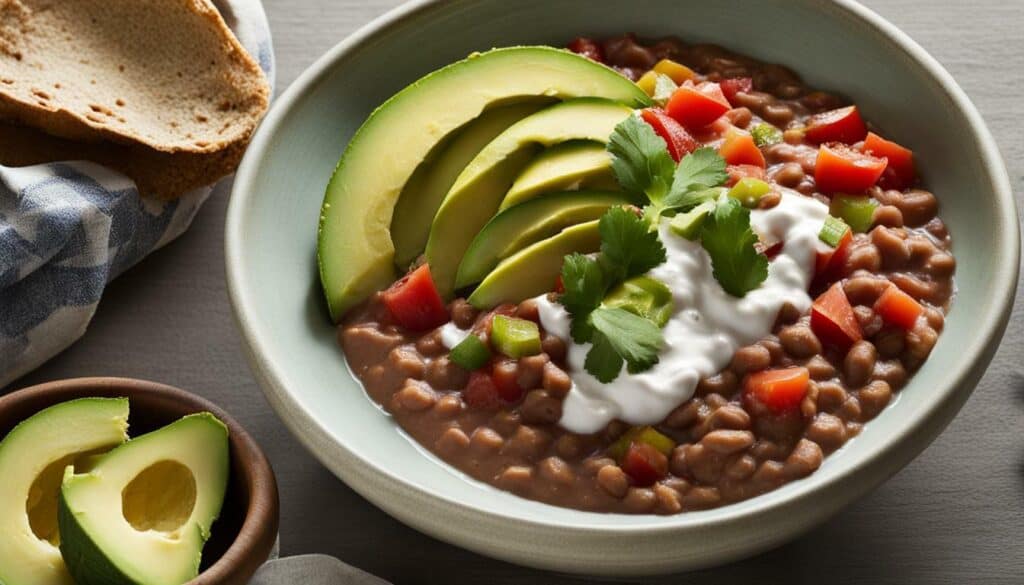
If you still want to enjoy refried beans but are concerned about potential health issues, there are a few strategies you can employ. Firstly, opt for organic black soybeans instead of traditional pinto beans. Black soybeans are lower in carbs and can be a healthier alternative.
Alternatively, you can explore other low-carb bean options like green beans or incorporate non-bean alternatives such as mushrooms, zucchini, or cauliflower into your refried bean recipes. These vegetables are lower in carbs and can still provide the taste and texture you love in refried beans.
Remember, when it comes to your health and wellness, it’s all about finding what works best for you. Experiment with different ingredients and approaches, always keeping in mind your personal dietary needs and preferences. By making informed choices and being mindful of portion sizes, you can still enjoy refried beans while minimizing potential health concerns.
Making Refried Beans More Keto-Friendly
Don’t worry, there are ways to enjoy refried beans while maintaining a keto-friendly diet. Let’s explore some options together. Traditional refried beans can be high in carbohydrates, which can hinder your progress on a low-carb, high-fat diet. However, by making a few simple swaps and modifications, you can still indulge in the delicious flavors of refried beans without compromising your ketosis.
One option is to substitute pinto beans with organic black soybeans. These beans are lower in carbs and can be used as a base for your refried bean recipe. Black soybeans are packed with protein and fiber, making them a nutritious alternative. You can find canned organic black soybeans in most grocery stores, making them easily accessible for your keto-friendly culinary adventures.
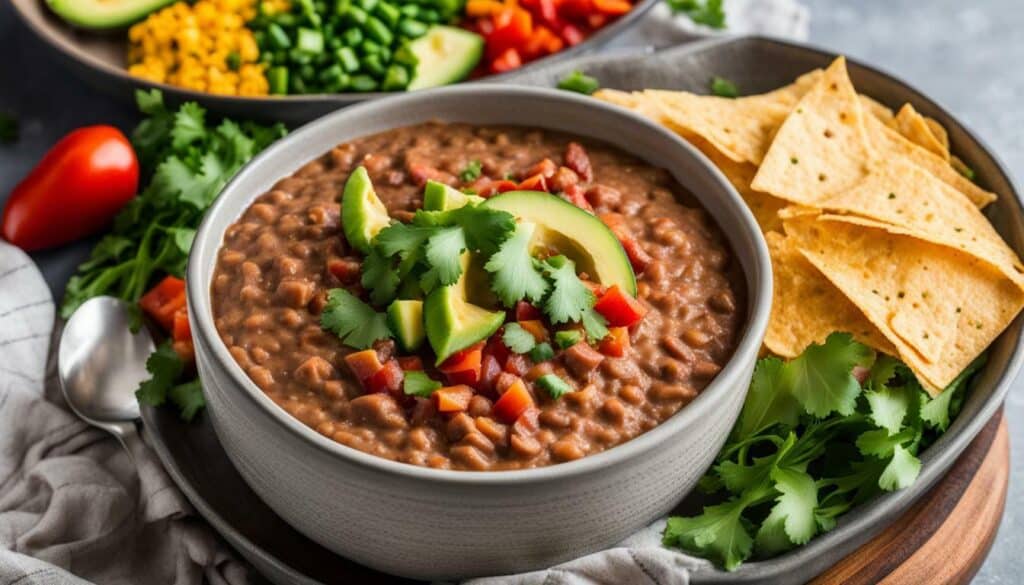
If you’re looking for even more variety, consider using green beans as a replacement for traditional refried beans. Green beans are low in carbs and provide a crunchy texture that can be satisfying in your favorite Mexican dishes. Additionally, black soybeans can also be used as a substitute for pinto beans. They have a similar taste and texture, making them a suitable option for your low-carb refried bean cravings.
| Refried Bean Alternatives | Net Carbs per Cup |
|---|---|
| Traditional Refried Beans | 26g |
| Organic Black Soybeans | 8g |
| Green Beans | 5g |
Benefits of Low-Carb Bean Alternatives
By incorporating low-carb bean alternatives into your keto diet, you can still enjoy the rich flavors of refried beans while staying within your daily carb limit. These low-carb options are not only delicious, but they also provide essential nutrients like fiber and protein, which are important for a well-rounded diet. Remember to practice portion control and consult with a dietitian or health professional to ensure you are making the best choices for your individual nutritional needs.
Incorporating Low-Carb Alternatives
If refried beans aren’t an ideal option for you, fear not! There are plenty of delicious low-carb alternatives that can be used in your favorite bean recipes. One option is to swap out traditional pinto beans for organic black soybeans. These soybeans are not only lower in carbs, but they also provide a rich and creamy texture that mimics that of refried beans. You can easily incorporate black soybeans into your refried bean recipe for a keto-friendly twist.
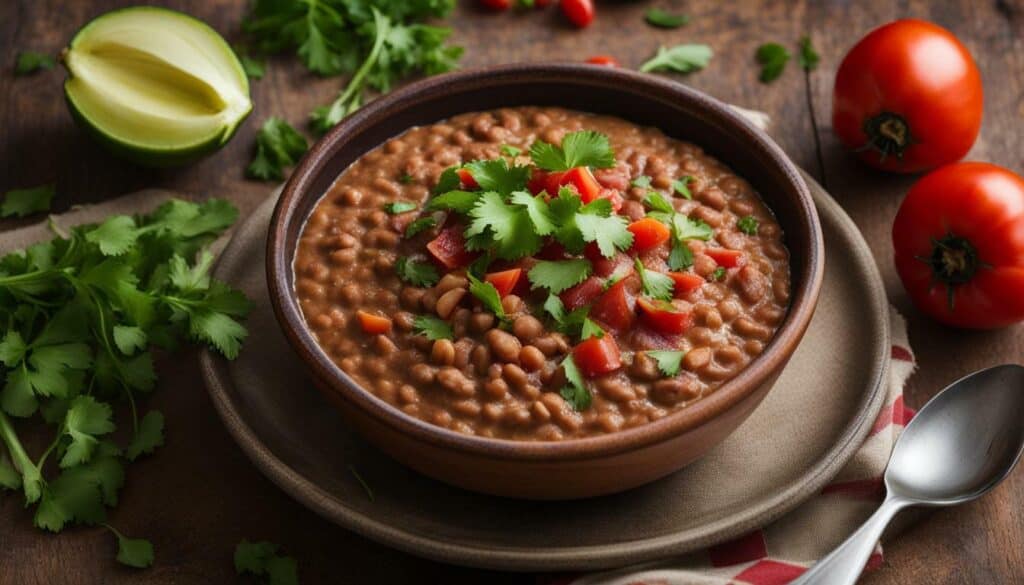
Another low-carb alternative to consider is using green beans in place of pinto beans. Green beans are not only low in carbs but also packed with nutrients like vitamins A and C. They can be cooked and seasoned to resemble traditional refried beans, offering a tasty substitution that aligns with your low-carb goals.
If you’re looking for even more variety, consider using other low-carb vegetables like mushrooms, zucchini, or cauliflower in your bean recipes. These vegetables can be chopped and cooked to a similar consistency as refried beans, providing a satisfying alternative that is low in carbs and high in flavor.
Low-Carb Alternatives in Bean Recipes
When incorporating low-carb alternatives into your bean recipes, it’s important to experiment with flavors and seasonings to achieve the taste you desire. You can add spices like cumin, chili powder, or garlic powder to enhance the flavor profile of these alternatives. Additionally, using healthy fats like avocado oil or coconut oil can help create a creamy texture similar to that of refried beans.
- Organic black soybeans: Substitute pinto beans with organic black soybeans for a low-carb and keto-friendly option.
- Green beans: Swap pinto beans with green beans to reduce carb content while still enjoying a similar texture and taste.
- Other vegetables: Experiment with mushrooms, zucchini, or cauliflower to create unique and low-carb alternatives in your bean recipes.
By incorporating these low-carb alternatives into your favorite bean recipes, you can still enjoy the flavors and textures you love without compromising your dietary goals. Remember to monitor portion sizes and consult with a dietitian or health professional for personalized guidance. With a little creativity and exploration, you can transform traditional refried beans into a low-carb delight.
Portion Control and Professional Guidance
You can still enjoy refried beans, but moderation is key. Let’s talk about portion control and why it’s important to consult with a professional.
When incorporating refried beans into a balanced diet, it’s crucial to practice portion control. A recommended serving size of refried beans is typically about 1/2 cup, which contains approximately 13g of net carbs. By being mindful of how much you consume, you can better manage your carb intake and maintain your dietary goals.
Seeking professional guidance from a dietitian or health professional is highly beneficial when it comes to incorporating refried beans into your diet. They can provide personalized advice based on your specific nutritional needs, goals, and any underlying health conditions you may have. They can help you determine the appropriate portion sizes and help you make informed decisions about including refried beans in your meals.
Portion Control Tips:
- Measure out the desired portion of refried beans using a kitchen scale or measuring cups.
- Consider pairing refried beans with other low-carb ingredients, such as grilled vegetables or lean protein, to create a well-rounded meal.
- Take note of the total carb count of your meal to ensure you’re staying within your daily carb limits.
- Pay attention to your body’s hunger and fullness cues to avoid overeating refried beans.
Remember, moderation is key. While refried beans can be enjoyed as part of a balanced diet, it’s important to be mindful of your carb intake and work with a professional to ensure you’re making the best choices for your individual needs. Consult your dietitian or health professional to find the right portion sizes and strategies for including refried beans in your diet.
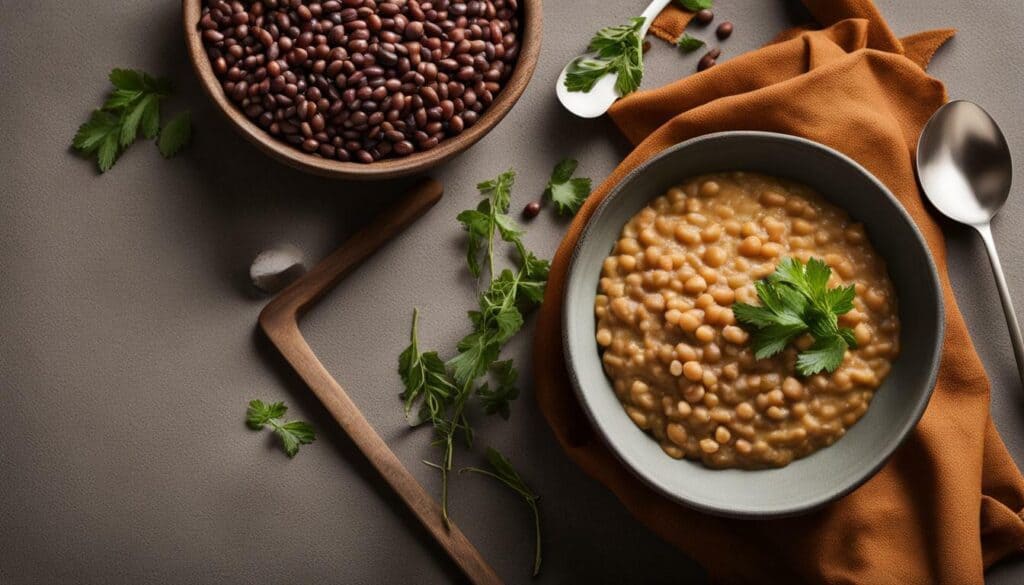
Organic black soybeans could be the secret ingredient for creating healthier refried beans. Let’s explore their nutritional value and how to use them in your cooking.
When it comes to refried beans, traditional recipes often call for pinto beans, which can be high in carbohydrates. However, by substituting pinto beans with organic black soybeans, you can significantly reduce the carb content while still enjoying the rich and creamy texture of refried beans.
Why choose organic black soybeans? These beans are not only lower in carbs but also packed with essential nutrients. They are a great source of protein, fiber, and vitamins, making them a nutritious addition to your diet. Plus, organic black soybeans are known for their antioxidant properties, which help combat inflammation and support overall health.
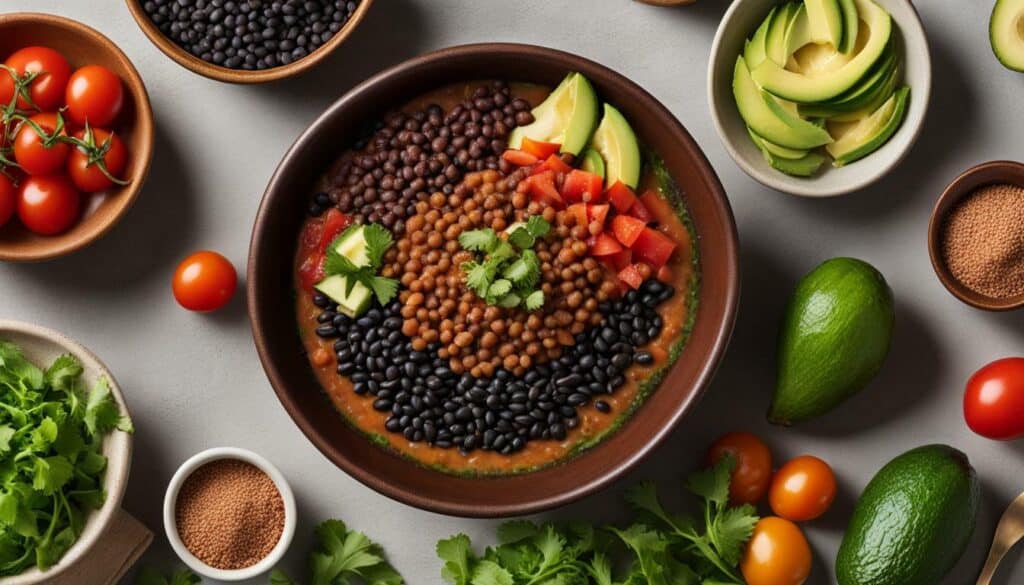
| Nutrient | Organic Black Soybeans (1 cup) |
|---|---|
| Carbohydrates | 8g |
| Protein | 22g |
| Fiber | 17g |
| Vitamin C | 6% of the recommended daily intake |
| Vitamin K | 20% of the recommended daily intake |
To incorporate organic black soybeans into your refried bean recipe, simply follow the same cooking process you would use for traditional refried beans. Soak the beans overnight, then cook them until tender. Once cooked, mash the beans with your preferred seasonings, such as garlic, onion, and spices. You can also add a splash of lime juice for a tangy twist.
By using organic black soybeans, you can enjoy the flavors of refried beans while keeping your carb intake in check. Whether you’re following a keto diet or simply looking for a healthier alternative, these nutrient-rich beans are a fantastic option. Experiment with different recipes and variations to find your perfect combination of flavors. Remember, moderation is key, and it’s always a good idea to consult with a dietitian or health professional for personalized guidance on incorporating refried beans into your diet.
Other Low-Carb Bean Options
Don’t limit yourself to just one type of bean. Let’s explore other low-carb options that can be used in your refried bean recipes. While traditional pinto beans may not be the best choice for a keto diet, there are alternatives that can still provide the taste and texture you love.
One option is to swap out pinto beans for organic black soybeans. These beans are lower in carbs and can be used to create delicious and keto-friendly refried beans. They have a similar texture and can be seasoned to your liking. Organic black soybeans can be found in most grocery stores or online.
| Bean Type | Net Carbs per Cup | Protein per Cup |
|---|---|---|
| Pinto Beans | 45g | 15g |
| Organic Black Soybeans | 8g | 14g |
| Green Beans | 5g | 2g |
Another low-carb option is to use green beans in place of traditional beans. Green beans are not only low in carbs but also high in fiber. They can be sautéed and seasoned to resemble the texture and flavor of refried beans.
For those who want to completely avoid beans, there are alternative ingredients that can be used in refried bean recipes. Mushrooms, zucchini, and cauliflower are all low-carb vegetables that can be cooked and mashed to create a similar consistency to refried beans. These alternatives offer a satisfying substitute while keeping your carb intake in check.
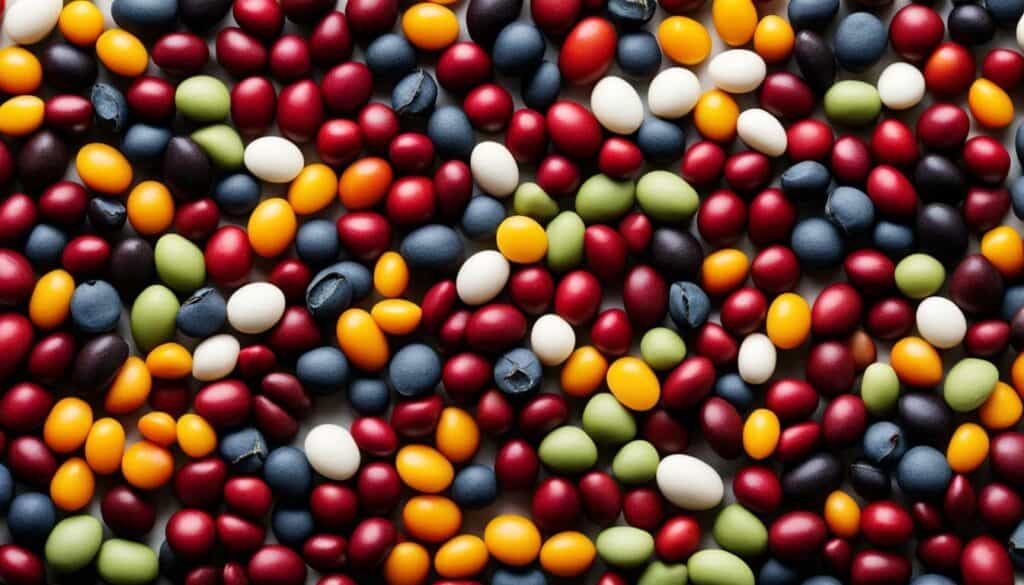
In conclusion, understanding the net carbs in refried beans allows for informed choices and adjustments to fit your diet goals. Remember, moderation and personalized guidance are key.
Refried beans are a popular side dish in Mexican cuisine, but for those following a keto diet, it’s important to be aware of their impact on carbohydrate intake. A cup of cooked refried beans contains 26g of net carbs, which exceeds the daily carb limit for many people on a keto diet.
It’s worth noting that consuming refried beans can also lead to inflammation and digestive problems in some individuals. However, there are strategies to make refried beans more keto-friendly. One option is to use organic black soybeans instead of pinto beans, as they are lower in carbs and can still provide the taste and texture you love. Green beans and black soybeans are also low in carbs and can be incorporated into a keto diet.
When incorporating refried beans into your diet, it’s important to practice portion control. Determining the appropriate serving size for your goals can help you stay within your carb limits. Seeking professional guidance from a dietitian or health professional can also provide personalized advice and support.
Additionally, there are other low-carb alternatives to beans that can be used in bean recipes. Ingredients like mushrooms, zucchini, and cauliflower can be substituted for beans to create delicious and low-carb alternatives.
By understanding the net carbs in refried beans and considering the alternatives, you can make informed choices that align with your diet goals. Remember to practice moderation, seek personalized guidance, and experiment with different low-carb options to find what works best for you.
FAQ
Q: Are refried beans keto-friendly?
A: Refried beans are not considered keto-friendly as they contain a high amount of net carbs, which can exceed the daily carb limit for those on a keto diet.
Q: Can refried beans cause inflammation and digestive problems?
A: Yes, some individuals may experience inflammation and digestive problems after consuming refried beans. It’s important to be mindful of how your body reacts to them.
Q: How can I make refried beans more keto-friendly?
A: One option is to use organic black soybeans instead of pinto beans, as they are lower in carbs. Green beans and black soybeans can also be incorporated into a keto diet.
Q: What are some low-carb alternatives to refried beans?
A: Mushrooms, zucchini, and cauliflower are low-carb alternatives that can be used in place of beans in recipes.
Q: How much should I eat of refried beans?
A: Portion control is important when incorporating refried beans into your diet. It’s best to consult with a dietitian or health professional for personalized guidance on serving sizes.
Q: Can organic black soybeans be used in refried bean recipes?
A: Yes, organic black soybeans can be used as a lower-carb alternative to pinto beans in refried bean recipes.
Q: What other low-carb bean options can I use?
A: Green beans and black soybeans are low in carbs and can be used to create delicious and low-carb alternatives to traditional refried beans.
What is the Carb Content in Pecan Pie Compared to Refried Beans?
When it comes to comparing the carb content, carbs in pecan pie are significantly higher than those in refried beans. While pecan pie is a delicious dessert known for its rich taste and indulgent pecan filling, it also packs a high amount of carbohydrates. On the other hand, refried beans, a traditional Mexican side dish, have a lower carb content, making them a healthier option for those watching their carb intake.

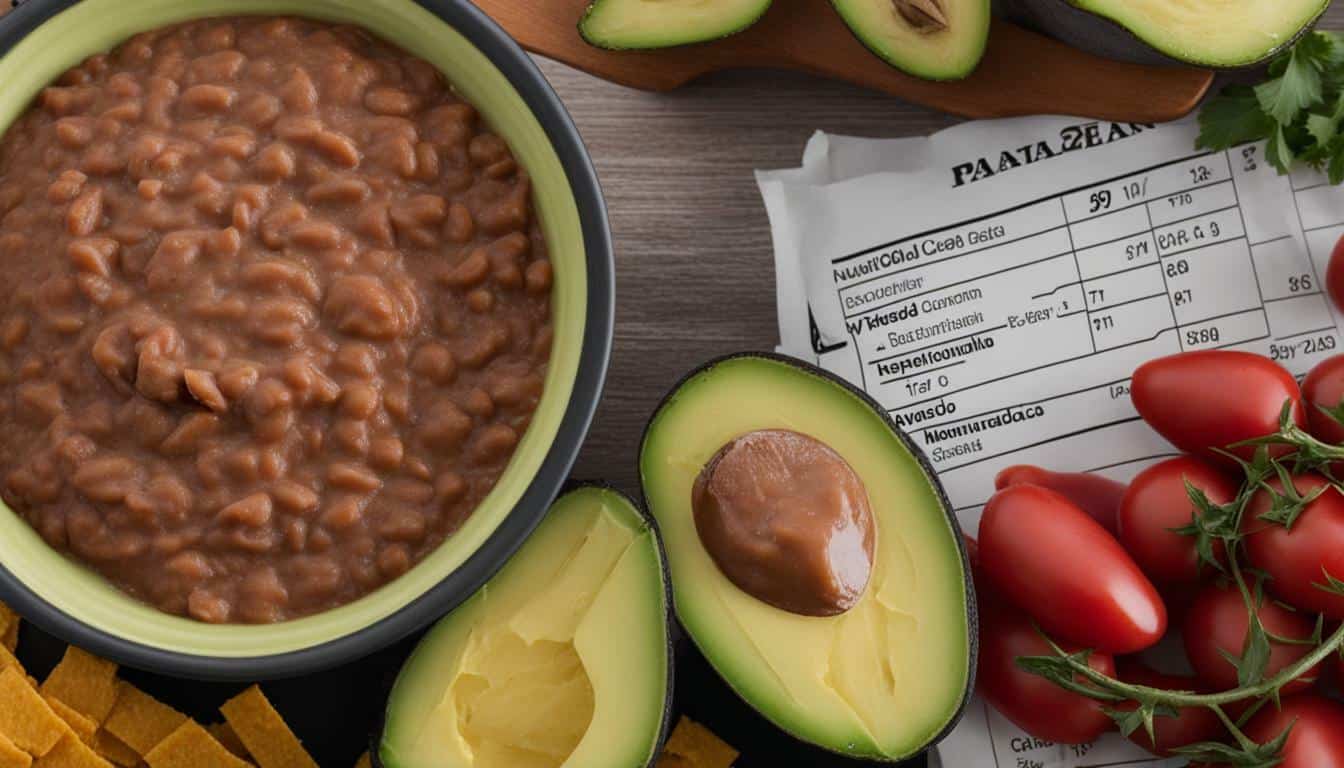



Leave a Reply